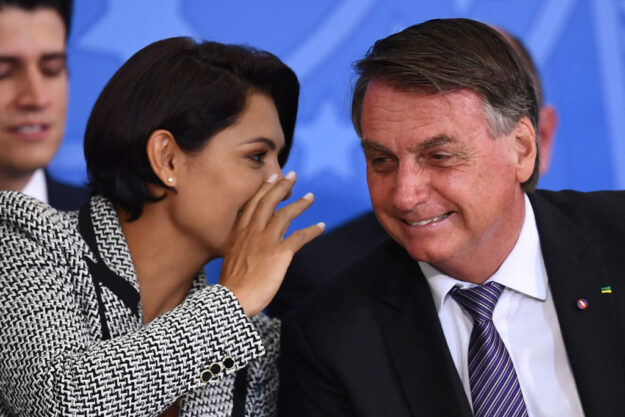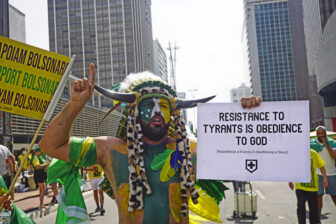This article has been updated.
SÃO PAULO — Returning to Brazil after two long years away, there are things that immediately strike you. The thousand different shades of green. The smiles. The particular way Brazil makes the hard things easy, and the easy things hard. But in April 2022 there is one phenomenon that you can only properly appreciate on the ground: the sense that President Jair Bolsonaro could, despite everything, still find a way to win this October´s election – or at least make things close enough to be messy.
Most credible polls still show former president Luiz Inácio Lula da Silva with a lead of 15 percentage points or more against Bolsonaro. But that margin has been slowly eroding, and with it the sense of inevitability that surrounded Lula’s candidacy for most of the past year. In a week spent between São Paulo and Rio de Janeiro, speaking with Brazilian politicians, business leaders, journalists, and dozens of everyday people, I repeatedly heard the view the race could still go either way – and that for now, the ground seems to be shifting in the incumbent’s favor. The question is why.
One major reason is the feeling that the pandemic has finally passed. COVID-19 exposed many of Bolsonaro’s worst qualities: his denial of science and facts, disorganized management, and lack of empathy for (or willingness to protect) vulnerable members of society. Brazil has lost more than 660,000 people, likely putting it among the world’s 15 highest per-capita death rates. If the election had been held in October 2021, Lula probably would have destroyed him. But during the week I was there, as mask mandates were being dropped and traffic was fully returning to normal, there was a sense of a page being turned. In meetings, including with some well-known Brazilian policy figures, all anyone wanted to discuss was Will Smith’s slap at the Oscars. When I marveled at this, a friend replied: “You have to understand, we’re tired. There’s a desire to forget, to focus on something new.” One new poll showed a majority of Brazilians rate Bolsonaro’s handling of COVID as either “good” or “OK” for the first time since early in the pandemic – likely reflecting relief that chapter now seems to be over.
So if this election isn’t about the pandemic, what will voters focus on instead? The conventional answer is the economy, and that this will favor Lula. But the reality is complex. Overall, activity remains moribund, as it has been for most of the last decade, with GDP expected to grow only 0.5% this year, one of the worst forecasts for any economy outside of Russia and Ukraine. The war may deny Brazil the relief Bolsonaro hoped for on the inflation front this year, with prices now forecast to rise 7%, following a 10% increase in 2021. But it’s not all bad – unemployment fell to 11.2% in February, its lowest level for the month since 2016. About a quarter of Brazilians live in households that receive “Auxilio Brasil,” Bolsonaro’s attempt to rebrand and modify Lula-era social programs. The agricultural sector is booming, and the real has been the world’s best-performing major currency this year. The economy has been so bad for so long that any rebound in 2022 may feel to consumers like a revelation.
All this could allow Bolsonaro to fight the election on the terrain that most favors him, a range of issues I’ll refer to here as “values.” This will include efforts to portray Lula and his Workers Party (PT) as woke radical leftists, out of step with a Brazil that is more socially conservative, and dominated by Evangelical Christian voters, than when Lula was first elected 20 years ago. To make their case in 2018, Bolsonaro supporters relied heavily on fake news, such as the infamous “penis-shaped bottle” the PT was supposedly distributing to students in São Paulo. Many believe Brazilian voters will be wiser this time around, and tech companies and electoral authorities appear more willing to crack down on misinformation. But consider the following — completely real — photo that Lula’s institute shared on its official Twitter feed two weeks ago, of the popular artist and drag queen Pabllo Vittar waving a Lula flag at a music festival:
Let me pause for a moment and say that I strongly support Vittar and the freedoms the artist represents. But I am not the average Brazilian voter. “That is exactly how Lula loses this election,” one political analyst told me, shaking his head – by promoting a U.S.- or European-style progressive agenda in a country where 51% of respondents in a recent poll agreed with the statement that “commercials with homosexual couples should be prohibited to protect children.” Bolsonaro and Lula are currently tied (37%-34%) among Evangelicals, who make up about a third of the electorate. The president’s advisers believe that by relentlessly focusing on “God, gender and guns,” to quote one, they can recover the much larger margins that were key to Bolsonaro’s victory in 2018. The president has been meeting with pastors, reminding them he named one Evangelical to the Supreme Court and could name another in a second term, pointing to a Colombian court’s February decision to decriminalize abortion as proof of the possible stakes. Such warnings may reverberate well beyond the megachurches: Just one in four Brazilians support legalizing abortion. That’s why even some PT supporters were mystified when Lula declared Tuesday that abortion should be freely available as a “question of public health,” a stronger position than he had previously taken, triggering a veritable storm of commentary on social media.
Is this really happening? Is it possible that after everything that has occurred over the last three years, Brazilians might vote again thinking of the culture wars? I arrived in Brazil expecting to find a mostly settled race, after signs voters permanently lost trust in Bolsonaro amid the pandemic. That may still be the case elsewhere in the country. But again and again in the two biggest cities, I kept finding people with doubts, suggesting a malleability that polls may not be fully capturing. “Bolsonaro is ignorant, tosco (uncouth), but at least he’s honest,” one social leader in Rio, seemingly unbothered by recent allegations against the government, told me. “I’m not sure yet.” Over the next six months, voters in one of the world’s most extremely online countries will be bombarded with memes, videos and news, real and fake. While I was there, Lula was photographed wearing an $18,000 Swiss watch at a Communist Party event in Rio – giving the bolsonarista social media machine yet another opportunity to paint him as corrupt. (Lula later said he received the watch as a gift while president.)
In conclusion, I still believe the favorite in this election is Lula, the most talented Brazilian politician of the last half-century, whom many both inside and outside the PT believe will shift more toward the center as the campaign progresses. There is little sign of demand for a “third way” candidate outside of certain business and media elites. But a window has clearly opened for Bolsonaro, who has been, against all expectations, the more disciplined candidate in recent months. Even if the president doesn’t win the vote outright, getting within a few points could allow Bolsonaro to pull a page from Donald Trump’s playbook and try to contest the election result, a maneuver many believe he has been preparing for for more than a year. In the meantime, bets continue to mount in Bolsonaro’s favor: 79 legislators, or about 15% of the chamber, recently switched their party affiliation to be part of the president’s coalition. In Brasilia, as elsewhere, the view is clear: This still looks like an open election.
This article was updated with Lula’s recent comments on abortion








